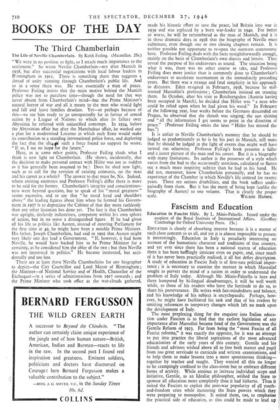BOOKS OF THE DAY
The Third Chamberlain
The Life of Neville Chamberlain. By Keith Felling. (Macmillan. 25s.) " WE were in no position to fight, so I attach much importance to the settlement." So wrote Neville Chamberlain—not after Munich in 1938, but after successful negotiations with local labour leaders in Birmingham in 1915. There is something there that suggests. a thread of unity running through Chamberlain's public life. And so in a sense there was. He was essentially a man of peace. Professor Felling insists that the main motive behind the Munich policy was not to purchase time—though the need for that was never absent from Chamberlain's mind—but the, Prime Minister's natural horror of war and all it meant to the men who would fight and fall and leave families desolate. Yet—or perhaps because of this—we see him ready to go unexpectedly far in favour of armed action by a League of Nations to which after its failure over Abyssinia he referred with unjustified contempt. In 1934, before the Abyssinian affair but after the Manchukuo affair, he worked out a plan for a modernised Locarno in which each State would make its contribution to a standing international police force, and deploring the fact that the idea* such a force found no support he wrote, " If so, I see no hope for the future."
Here, as at some other points, Professor Feiling sheds what I think is new light on Chamberlain. (He shows, incidentally, that the decision to make personal contact with Hitler was not as sudden as it has generally been assumed to be.) Does he shed new light, such as to call for the revision of existing estimates, on the man and his career as a whole? The answer to that must be, No. Indeed, where existing estimates and Professor Feiling's differ there is more to be said for the former. Chamberlain's integrity and conscientious- ness were beyond question, but to speak of his " moral greatness " seems excessive, and to say that " he stood head and shoulders above " the leading figures about him when he formed his Govern- ment in 1937 is to depreciate the Cabinet of that day more ruthlessly than any other historian has done yet. The fact is that Chamberlain was upright, tirelessly industrious, competent within his own sphere of action, but in no sense a distinguished figure. If he had given all his life to politics like Austen, instead of entering Parliament for the first time at 49, he might have been a notable Prime Minister. His father, Joseph Chamberlain, had said in 1902 that Austen might very likely one day lead a Government. " If, however, it had been Neville, he would have backed him to be Prime Minister for a certainty, as he considered him the abler of the two ; but then Neville was not interested in politics." He became interested, but acci- dentally and too late.
There are at least three Neville Chamberlains for any biographer to depict—the City Councillor and Lord Mayor of Birmingham ; the Minister—of National Service and of Health, Chancellor of the Exchequer—in a series of administrations from 1917 onwards ; and the Prime Minister who took office as the war-clouds gathered, made his historic effort to save the peace, led Britain into war in 1939 and was replaced by a born war-leader in 1940. For better or worse, he will be remembered as the man of Munich, and it is in those dramatic days in 1938 that the biography of Neville must culminate, even though one or two closing chapters remain. It is neither possible nor opportune to re-open the outworn controversy here. Professor Feiling deals with the facts straightforwardly enough, mainly on the basis of Chamberlain's own diaries and letters. They reveal the purpose of his endeavours as sound. The situation being what it was, there was no other course to take, and Professor Feiling does more justice than is commonly done to Chamberlain's endeavours to accelerate rearmament in the immediately preceding years. But there was a strange and fatal simplicity in his approach to dictators. Eden resigned in February, 1938, because he mil trusted Mussolini's professions ; Chamberlain insisted on trusting them. In October, after his visit to Berchtesgaden (Austria having been occupied in March), he decided that Hitler was " a man who could be relied upon when he had given his word." In February of the following year, four weeks before the Germans descended on Prague, he observed that the thrush was singing; the sun shining and " all the information I get seems to point in the direction of peace." (Professor Feiling omits the later " Hitler has missed the bus.") It is unfair to Neville Chamberlain's memory that he should be judged so predominantly as he is by his part in Munich, still more that he should be judged in the light of events that might well have turned out otherwise. Professor Feiling's book presents a fitller and a juster picture of the man and his career. But it is a biography with many limitations. Its author is the possessor of a style which varies from the bad to the occasionally atrocious, calculated to flatten out a much more inspiring subject than he had to his hand. He did not, moreover, know Chamberlain personally, and he has no experience of the Chamber in which Neville's life centred for twenty years. These are serious disabilities, and the book suffers undis- guisedly from them. But it has the merit of being kept (unlike the biography of Austen) to one volume. That is clearly the proper






























 Previous page
Previous page